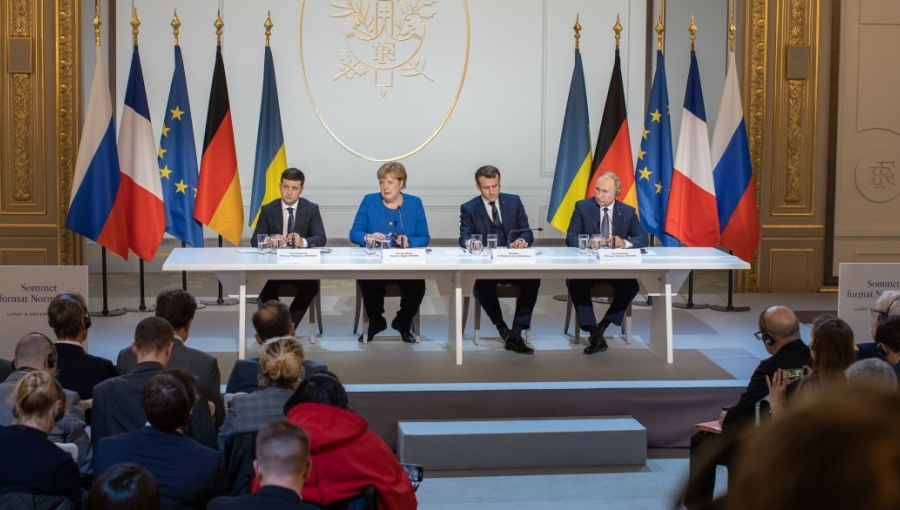The aim of this short analysis is to provide you with an insight on the Minsk agreements (shortly MA) and the practical impossibility to implement them into real life. These agreements were signed (even Russian experts admitted it) under time and external conditions pressure and possibly due to these reasons the texting and concrete measures included in the Package of Measures (to be taken in order to implement MA) are ephemeric and vaguely prescribed. That means that the texting of the MA could be understood by different stakeholders differently or, to put it simplier, they are far from ideal.
It seems to us, that signatories of the MA hastened to sign at least some agreement, even if that meant that the signed document could not be implented in the future. If somebody blames Ukraine or unrecognized republics of Donbass (DNR, LNR) for not taking concrete measures envisaged by the Minsk agreements or if any of the parties from Normandian format (Germany, France, Russia and Ukraine) consider the full implementation of the Minsk agreements as a precondition for the next negotiation on the future of Donbass that looks at least cynical. In the first case, it is recommended for journalists and analysts to read carefully the text of Minsk agreements (MA) in order to understand how vaguely are the concrete measures prescribed.
Package of Measures for the Implementation of the Minsk Agreements includes 13 measures which should be taken step by step. So let us give you some examples of vague texting from the Package of measures for the implementation of MA:
3. Effective monitoring and verification of ceasefire regime and pullout of heavy weapons by OSCE will be provided from the first day of pullout, using all necessary technical means such as satellites, drones, radio-location systems etc.
What is meant by effective monitoring and verification of ceasefire regime and pullout of heavy weapons by OSCE? How it should look like? Which verification methods will be used and who will determine what is effective or ineffective monitoring or verification? Unfortunately the formulation of this measure is not concrete and requires more details.
Let’s continue:
4. On the first day after the pullout a dialogue is to start on modalities of conducting local elections in accordance with the Ukrainian legislation and the Law of Ukraine “On temporary Order of Local Self-Governance in Particular Districts of Donetsk and Luhansk Oblasts,” and also about the future of these districts based on the above-mentioned law.
We specially put the crucial part of the measure in bold and you hopefully already found out that starting a dialogue on modalities of conducting local elections is again a vague texting, that means that it could have different meanings. This measure sounds quite imperfect and even raises the question: Did the signatories of the document were really aware of the difficulties that they might face during implementing of such vaguely formulated measures? Or it was done deliberately?
The more we study the agreements, the more we see that the impossibility to implement the Minsk agreements has been anticipated by its signing. Russia most likely understands that Minsk agreements are so disadvantageous to Ukraine that Kiev will never implement them and the conflict in Donbass may be frozen for a very long period of time, unless Kiev (impossibly) accepts all unfavourable measures from MA. Kiev’s not implementing the measures from MA gives Russia a pretext to say that Kiev is not interested in implementing them at all and therefore the responsibility for the situation in Donbass should be put first of all on Kiev. This is a very rational and diplomatically booletproof argument, as it is fully in accordance with the Minsk agreement signed in February 2015. Our question is why the previous president of Ukraine Mr. Poroshenko could ever signed such an unfavourable agreement for Ukraine which his country would hardly be able to implement? The only answer is: he played a long term policy, hoping that the anti-Russian sanctions will change the external conditions and Russian’s hard position as well. But that never happened.
The new Ukrainian president Zelensky very soon understood that he cannot fulfill the conditions of the MA and even tried to persuade Putin in Paris (December 2019) during Normandy format talks, that the external conditions have changed and it is time to make some compromise on MA. But Russia is evidently not ready to renegotiate already signed document and the status quo in Donbass will not change for the foreseable future. Today it is clear to all stakeholders that the texting of Minsk agreements is unfavourable to Ukraine and the signing of MA by Mr. Poroshenko was practically a diplomatic victory of the Kremlin.
In order to find solution to the Donbass issue it is crucial for the public to know the truth that signatories from both sides signed the document which could not be implemented into real life and they knew about that fact from the very beginning. Many politicians, diplomats and journalists and even independent specialists tend to say that the fullfilment of the Minsk agreements is the necessary basis for the peaceful settlement of the situation in Donbass. But they seem to be unaware of the fact that MA in its latest signed version (February 2015) cannot be implemented, because it needs constitutional changes in Ukraine and that hardly could happen. To be continued.


Leave a comment